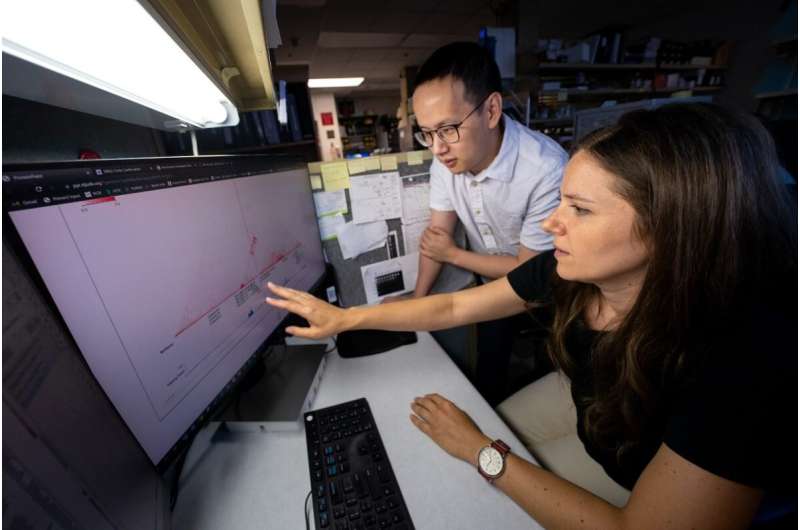Analysis reveals origins of a leukemia that straddles diagnostic categories

Researchers have identified gene alterations that drive a subset of acute leukemias in children and adults. These leukemias previously defied classification, making diagnosis and treatment challenging. Investigators at St. Jude Children's Research Hospital and the Munich Leukemia Laboratory led the study, which appeared online in the journal Cancer Discovery.
Using integrated genomic analysis of 2,573 cases of adult and children with acute leukemia together with experimental modeling, researchers identified deregulation of the BCL11B gene as the culprit in about 30% of acute leukemia cases that transcend current diagnostic boundaries. The analysis showed that altered BCL11B expression also drives a small number of acute myeloid leukemia (AML) cases.
Four percent of acute leukemia is difficult to classify using current methods, which rely on cell surface markers and other features to categorize them as myeloid or lymphoid. These cases are often called mixed phenotype acute leukemia (MPAL), acute leukemias of ambiguous lineage (ALAL) or early T-cell precursor leukemia (ETP-ALL) because the leukemia cells exhibit features of lymphoid and myeloid lineages.
"We know that leukemia is a genetic disease, but many cases are not classified or treated according to their underlying genetic drivers," said Charles Mullighan, M.B.B.S., M.D., of the St. Jude Department of Pathology. "For lineage-ambiguous leukemia, the right treatment has been unclear and the outcomes poor.
"Identifying the biologic basis of this group provides a critical first step in understanding disease development," he said.
Mullighan; Jeffery Klco, M.D., Ph.D., of St. Jude Pathology; and Claudia Haferlach, M.D., of the Munich Leukemia Laboratory are the corresponding authors of the research.
The work also provided clear evidence that leukemia driven by BCL11B expression arises in blood progenitor cells rather than in developing T cells. The cell of origin in lineage ambiguous leukemia has been debated among researchers.
BCL11B: Multiple routes to deregulation
BCL11B encodes a transcription factor that plays a central role in T cell development. BCL11B expression is normally repressed in primitive blood cells, including progenitor cells.
The new subtype is called BCL11B-deregulated/rearranged leukemia. The name reflects the multiple types of genomic alterations that resulted in aberrant BCL11B expression. The analysis, which included whole genome and RNA-sequencing data, identified a variety of structural DNA rearrangements that deregulate BCL11B expression. These included rearrangements to multiple chromosomal regions that harbor gene regulatory regions, or enhancers, that are active in blood stem cells. An additional alteration was amplification of DNA downstream of the BCL11B gene that generated a new enhancer.
Researchers used Hi-ChIP, a method to assess the 3D structure of genomes, to examine chromosome looping and showed the rearranged stem cell enhancers contact BCL11B in leukemic cells. As a result, rather than driving T cell differentiation, premature BCL11B expression fuels the transformation of progenitor cells into leukemic cells.
Researchers identified several genes that were often altered in the new subtype. The most common was the FLT3 gene, which was mutated in 80% of BCL11B cases. Collectively, the BCL11B-rearranged subtype accounts for approximately one-third of cases previously diagnosed as T/myeloid MPAL or ETP-ALL.
"These exciting results could only be achieved because we approached the question together from different angles and had fruitful discussions—a perfect example of transatlantic cooperation," Haferlach said.
The clinical implications of BCL11B
FLT3 inhibitors are in use for treatment of AML. Future studies are needed to test these inhibitors for treatment of the new BCL11B subtype. Previous research suggests that a targeted therapy that inhibits the BCL2 protein may also have a future role in treatment.
"The study illustrates the need to move away from classical methods for leukemia classification and adapt a unified molecular classification that reflects the genomic or biological features of acute leukemias," Klco said. "In the future we hope that treatment plans can also be adapted to target specific molecular alterations driving the cancer."
More information: Lindsey E Montefiori et al, Enhancer hijacking drives oncogenic BCL11B expression in lineage ambiguous stem cell leukemia, Cancer Discovery (2021). DOI: 10.1158/2159-8290.CD-21-0145




















